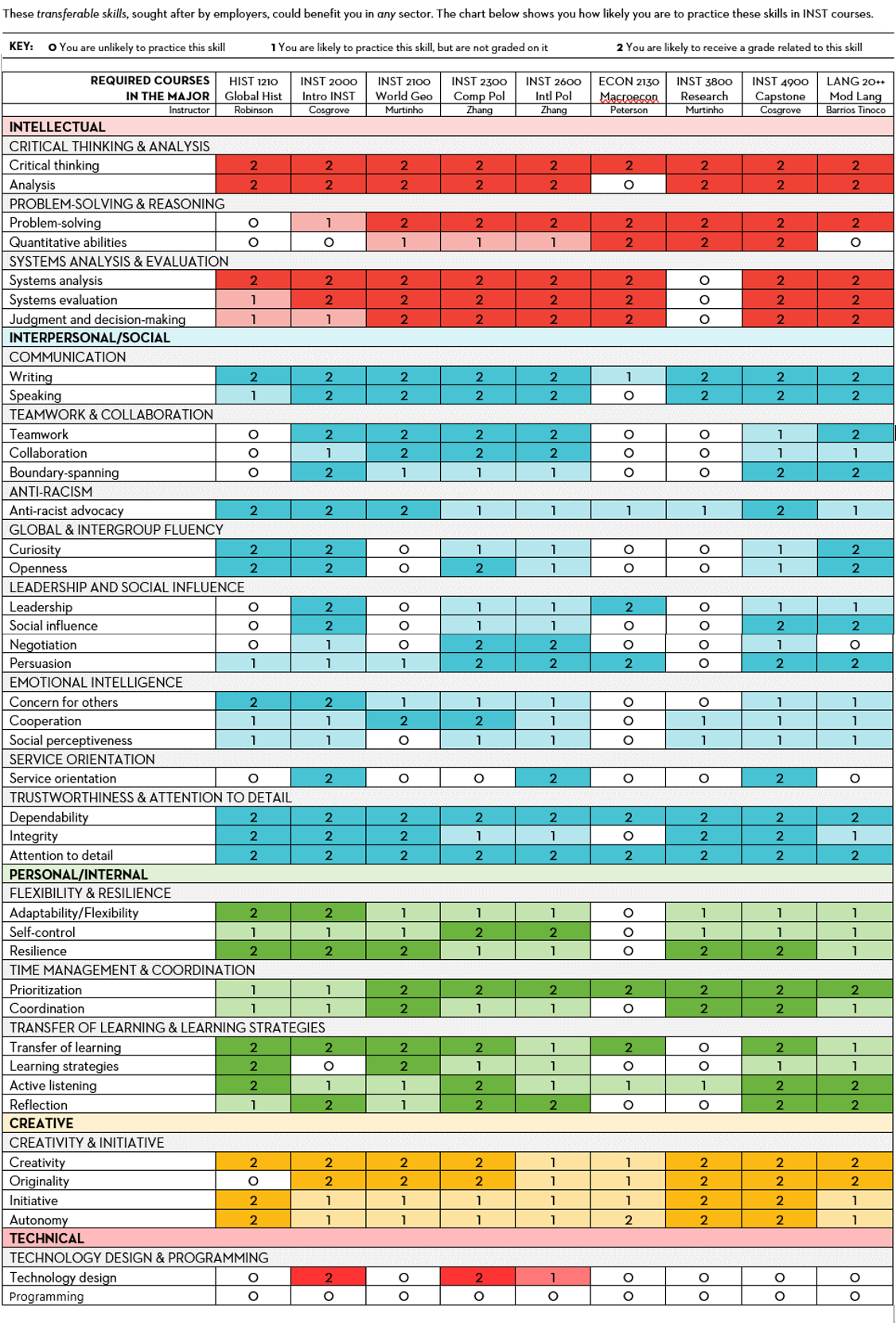
Career readiness

Being “career-ready” means that you’ve developed a range of skills that you can transfer to different settings once you graduate.
At Seattle U, we take your career readiness seriously, so we’ve created an inventory and program-level map to help you see what skills you’re likely to practice in your major.
Career readiness through an International Studies degree
Here you can download our career readiness map for the International Studies major, as well as a document explaining how to read the inventory and what each of the skills means.
- INST Career readiness program map [downloads PDF]
- Career readiness - overview for students [downloads PDF]
International Studies Career Readiness program map
-
View the downloadable program map here
-

Download this chart as a PDF, as well as an explanation of what it all means for you:
Your career readiness skills and what they all mean
-
Intellectual skills
-
Critical thinking
Identify the assumptions that frame thinking and analyze them for accuracy and validity.
Analysis
Analyze and monitor/assess your own performance, or that of other individuals or organizations to make improvements or take corrective action.
Problem-solving
Use logic and reasoning to evaluate alternative solutions, conclusions, or approaches.
Quantitative abilities
Apply mathematical and quantitative reasoning to propose or evaluate solutions.
Systems analysis
Determine how a system should work and how changes in conditions, operations, and the environment will affect outcomes.
Systems evaluation
Identify measures or indicators of system effectiveness and the actions needed to improve or correct performance, relative to the goals of the system.
Judgment and decision-making
Consider the relative virtues and drawbacks of potential actions to choose and justify a contextually appropriate decision.
-
Interpersonal/Social skills
-
Writing
Communicate effectively in writing as appropriate for the needs of the audience.
Speaking
Present to or talk with others to convey information as appropriate for the needs of the audience.
Teamwork
Work within a team structure and negotiate and manage conflict.
Collaboration
Build mutually rewarding relationships with colleagues and partners
Boundary-spanning
Reach across silos to gather and share information, especially with people who are different from us (e.g. demographically, politically, functionally, disciplinarily)
Anti-racist advocacy
Acknowledge the harm of systemic and personal racism, affirm the experiences of people of color, and act to dismantle racist systems and practices.
Curiosity
Value and learn from diverse cultures, races, ages, genders, sexual orientations, religions, and other human differences.
Openness
Demonstrate openness and humility in interacting across cultural, demographic, and positional differences.
Leadership
Inspire others toward a common goal or vision, offering direction and opinions as needed.
Social influence
Advocate for and encourage value-driven change.
Negotiation
Facilitate dialogue to reconcile differences.
Persuasion
Present evidence and argumentation to encourage others to consider alternative positions.
Concern for others
Exercise sensitivity to others' needs and feelings.
Cooperation
Present your most constructive, open-minded self in group settings in order to reach a common goal.
Social perceptiveness
Attend to others' reactions and adapt your behavior in response.
Service orientation
Engage with community members in the shared responsibility for social change.
Dependability
Fulfill obligations by being reliable, responsible, and dependable.
Integrity
Act responsibly and consistently with the interests of the larger community in mind.
Attention to Detail
Review, revise, and complete tasks thoroughly and carefully.
-
Personal/Internal skills
-
Adaptability/flexibility
Adapt to differing contexts, personalities, and tasks.
Self-control
Be aware of and express emotions in ways that invite yourself and others to entertain alternative perspectives.
Resilience
Adapt to experience of difficulty or critical feedback by reflecting carefully and making appropriate behavioral adjustments.
Prioritization
Manage your own time to align with priorities.
Coordination
Adjust actions in relation to others' actions and respect their time.
Transfer of learning
Integrate new information with prior knowledge and experience and transfer it to new realms.
Learning strategies
Select and use learning methods and procedures appropriate for the situation when learning or teaching new things.
Active listening
Fully attend to what others say, reflect on points or on critical feedback, and ask questions as appropriate.
Reflection
Make meaning out of experiences, ideas, and contexts through thoughtful consideration, self-exploration, and discernment.
-
Creative skills
-
Creativity
Generate unique ideas and interpretations or adapt them to new settings.
Originality
Devise unusual or imaginative ideas about a topic or situation.
Initiative
Show willingness to take on responsibilities and challenges.
Autonomy
Take responsibility for your own learning with little supervision.
-
Technical skills
-
Technology design
Generate or adapt equipment and technology to serve user needs.
Programming
Write computer programs for various purposes.
Connect with our Career Engagement Office
The Career Engagement Office helps you in your career exploration, discovery of experiential learning opportunities, job search, interview preparation, and more. Check it out!
Background
-
Career readiness at Seattle U
-
The transferable skills we’re listing here come from three main sources: the National Association of Colleges and Employers’ 2019 graduate competencies list, World Economic Forum’s The Future of Jobs 2018 report, and Seattle University’s own outcomes and mission, which we know can give you additional strings to your bow that employers really appreciate.
-
How does it work?
-
The various transferable skills are grouped into five clusters:
- Intellectual
- Interpersonal/Social
- Personal/Internal
- Creative
- Technical
For each of those clusters, we list multiple components along with definitions to help you see what each of the skills means to employers and organizations.
The faculty in International Studies have examined the courses that all INST majors take and have rated the extent to which you will practice and be able to demonstrate your abilities when those faculty are teaching the course. This gives you a sense of the kinds of skills you’re like to develop in the INST degree.
-
How were courses rated?
-
Faculty rated their courses for each of the skills using this scale:
2 = You’ll receive a grade related to this skill in this course.
1 = You’ll practice this skill, but are not graded on it in this course.
0 = You’re unlikely to practice this skill in this course.
If the score is a 2, then that means you’re likely to have some sort of artifact that you can use to be able to demonstrate your skill development to potential employers. This might be a written assignment, a policy briefing paper, a presentation, and so on.
If the score is 1, then you’ll be practicing the skill, but won’t necessarily have an artifact to show for it. You will, though, still have experiences from the class to draw on in interviews.
If the score is 0, then don’t worry: even if you don’t have chance to practice that skill as part of your degree, there are still plenty of co-curricular opportunities at SU where you can round out your skills development.
You can also use the career readiness inventory to build your résumé and reflect on the skills you have developed.
Alumni Stories
"I learned to respectfully relate with people from other cultures, while adapting to their social norms." Ruth Yohannes '19
Contact Us
Felipe Murtinho, PhD
Director
Casey 310-18
206.296.2088
murtinhf@seattleu.edu
Reine Mages
Administrative Coordinator
Casey 310
206.296.2487
magesr@seattleu.edu
Student Executive Council (SEC) Representative
INST-SEC@seattleu.edu
